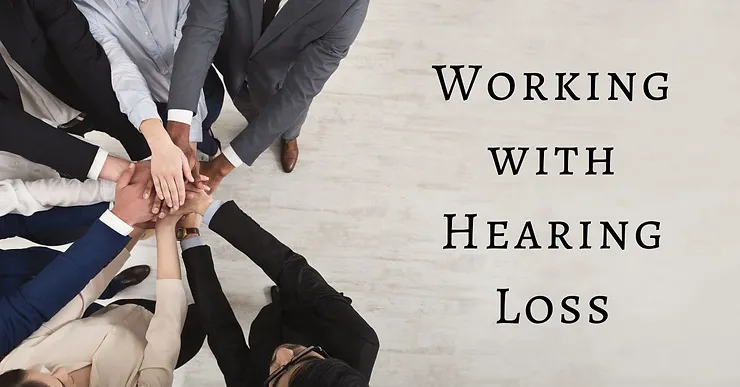
It can be challenging to feel empowered and even successful at work when you are living with disabling hearing loss. With the right tools and information, however, you can feel more confident and a sense of pride in the work you do.
The Centers for Disease Control and Prevention (CDC) estimates 22 million people in the U.S. are exposed to hazardous noise levels at work, making hearing loss the most common work-related injury. Without the proper equipment and preparation, you could be at risk for irreversibly injuring your hearing on the job.
Know Your Rights
Hearing loss is an ‘invisible’ disability, which is to say that not everyone with disabling hearing loss wears a hearing aid or other device that might offer a visual cue to an observer, and for those who wear hearing aids they are mostly inconspicuous. There are laws in place, though, that protect all people with disabilities while in their place of work. The Americans with Disabilities Act requires employers to provide reasonable accommodation for all employees with hearing loss. All one has to do is ask if they should need to sit in the front during training courses or if they need a sign language interpreter. Both the employee and employer both benefit when these accommodations are met.
Safety and the laws protecting your hearing health in the workplace are meant to work in tandem. In a Safety and Health information Bulletin dated December 2005 from the Occupational Safety and Health Administration (OSHA) at the US Department of Labor, there are decibel-specific guidelines for the use of hearing protection, different types of ‘specialized hearing protectors,’ and several paragraphs on how to select and fit hearing protection devices.
The Department of Labor estimates $242 million is spent annually on worker’s compensation for hearing loss disability. Knowing your rights in the workplace can keep you safe and feeling supported to ask for accommodation can help you succeed. Alison Grimes, a UCLA audiologist suggests beginning a conversation in this way: “I really want to hear what you say. So, can you face me and speak a bit more slowly?”
If you are passive rather than confident about your needs for effective communication, your hearing loss will win out during conversation and social interaction.
Preparation
When you have meetings, once-off or otherwise, request a written agenda beforehand to make sure you follow the discussion. You should always make sure you go in with the advantage, and not the other way around. You can also ask that someone be present as a notetaker or ask for the meetings minutes afterward.
One spatial accommodation that may be beneficial to you is to ask that the meeting be held at a round table. This ensures that everyone can be seen when speaking, which is very important if you rely on lipreading. Remember to point the directional mic, if applicable, in your hearing aids at the speaker and ask the facilitator of the meeting to avoid allowing multiple people to speak at once.
Take Advantage of Available Technology
You can take advantage of many new technologies to help in the workplace. There is a loop system, for instance, for meeting rooms that uses wireless technology magnetic signals to transmit sound from the speakers and microphone to a wire that in circles the room. Anyone wearing a hearing aid or cochlear implant can retrieve those signals no matter where they are seated in the room.
You could also ask your employer to look into tech that translates spoken words to readable text, something that could be quite useful in meetings. Computer Assisted Real Time Transcription (CART) projects words onto your laptop or a large screen as they are spoken. If you are in the market for a portable device, the UbiDuo 2 allows you and a co-worker to type to each other face-to-face, and there are video-captioned telephones that allow you to see the person you are speaking to and the captioned text they are speaking.
Check with your employer if any of these tips can be implemented to make your routine at work more equitable. Hearing loss should not be burdensome at work nor an indicator of failure or being less-than. If hearing aids are an option for you or you want to know more about them, reach out to us at Clear Hearing and Audiology.
